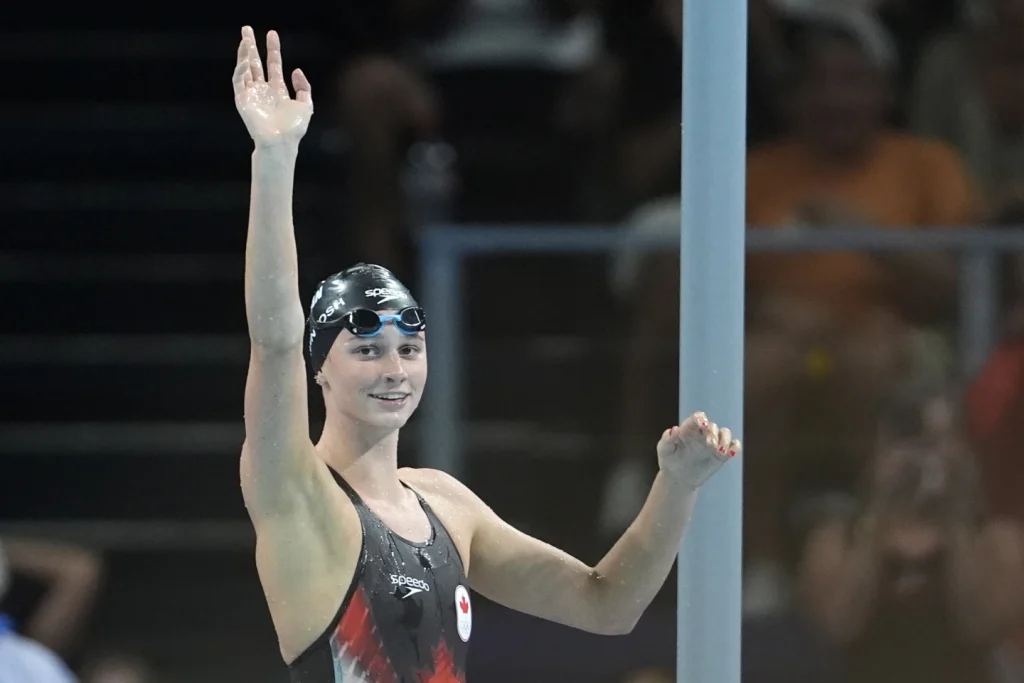In the world of competitive swimming, few athletes have made as profound an impact in such a short time as Summer McIntosh. The promising Canadian swimmer is currently poised to celebrate a significant milestone: her 18th birthday on August 18.
As she approaches this pivotal moment in her life, her achievements in the pool stand as a testament to her skill, tenacity, and unyielding dedication to her sport.
McIntosh’s journey has already been highlighted by a remarkable collection of Olympic medals, including a silver in the 400-meter freestyle and golds in both the 400 individual medley and the 200 butterfly.
Her burgeoning career not only underscores her talent but also exemplifies the rigors and nuances of high-level athletic competition.
The weight of an Olympic medal is often described as a tangible representation of the culmination of years of hard work and sacrifice. McIntosh’s candid reflection on the surprising heaviness of her silver medal encapsulates this sentiment.
She expressed her initial shock at the physical weight of the medal, signifying that such achievements can carry emotional weight as well. This duality of experience serves as a powerful metaphor for the journey of elite athletes, wherein joy and burden coexist.
The medals, as significant markers of success, also symbolize the pressures and expectations that accompany high-stakes competition.
As she continues to compete at an extraordinary level, McIntosh is also preparing for her next challenge: the 200-meter individual medley (IM). Despite securing the second-fastest time of the semifinals, she remains undeterred.
“It’s those races when I’m not in my tip-top form that I learn the most from,” she remarked, highlighting her ability to derive valuable lessons from the competitive process. Such introspection is rare among athletes her age, further setting her apart in the swimming world.
Moreover, her appreciation for the learning curve associated with competing at an elite level demonstrates a maturity beyond her years, suggesting that her growth as an athlete is just as important as winning medals.
McIntosh’s profound connection to her sport is undoubtedly influenced by familial ties, particularly her relationship with her mother, Jill Horstead, a former Olympian herself.
The excitement and pride visible in her mother’s reaction during McIntosh’s record-setting performance in the 200 butterfly not only underscore the significance of their shared experiences but also highlight the emotional fabric woven into competitive swimming as a familial legacy.
For McIntosh, the ability to share such a milestone with her mother ennobles her accomplishments, as they both understand the sacrifices required to reach the pinnacle of athletic success.
Despite the accolades and the media attention that accompanies elite athletic performance, McIntosh maintains a grounded perspective on her routine and mental preparation.
Her decision to prioritize simplicity by focusing on essential practices—such as eating, sleeping, and a little music—reveals an astute understanding of the holistic nature of athlete wellness.
In her own words, “It’s a lot more simple than probably people think behind the scenes.” This acknowledgment of balance emphasizes that a successful swim career does not merely hinge on physical prowess but also requires mental clarity and emotional stability.
This practical approach serves not only as a coping mechanism during intense competition but also as an essential framework for long-term sustainability in her athletic endeavors.
As McIntosh embarks on what is likely to be a continuing and illustrious career, her achievements serve as an encouraging example for aspiring athletes around the world.
Her journey thus far has been marked by resilience, adaptability, and an unwavering commitment to her sport. The development of her career will not merely reflect her performance statistics but will also serve as a narrative of personal growth, emotional richness, and familial bonds, painting a comprehensive picture of what it means to excel in the demanding realm of athletics.
Kylie Masse, a fellow Canadian swimmer and bronze medalist in the same event, articulated the admiration many have for McIntosh’s poise and ability to switch between events with remarkable agility.
Masse’s observations highlight a fundamental aspect of competitive swimming: the physical and mental demands placed on athletes who must frequently transition from one race to another.
The ability to perform under such conditions is not merely a testament to an athlete’s physical training but also to their psychological preparedness. McIntosh’s capacity to manage the rigors of back-to-back events, as noted by Masse, reflects a level of maturity and discipline that is often elusive, even among seasoned competitors.
The mental aspect of competition cannot be overstated. Athletes like McIntosh must cultivate the ability to “turn off” between races, a skill that allows them to conserve energy and focus.
This mental reset is crucial, as it enables athletes to approach each event with a fresh mindset, free from the fatigue and emotional residue of previous performances.
McIntosh’s acknowledgment of this necessity underscores her understanding of the psychological complexities inherent in elite sports. Her ability to compartmentalize her experiences—focusing solely on the task at hand—demonstrates a level of maturity that belies her age.
Furthermore, McIntosh’s experience at the Olympic Games is not just about individual glory; it is also about national representation.
Despite the absence of fervent support akin to that enjoyed by celebrated athletes like Léon Marchand, McIntosh has felt a profound connection to her Canadian roots, as evidenced by the enthusiastic support from fans waving the Maple Leaf.
This sense of national pride adds an additional layer of motivation for athletes competing on the world stage. McIntosh’s reflections on the honor of representing Canada highlight the emotional weight carried by athletes who embody the hopes and aspirations of their nation.
The prospect of leaving Paris with a medal in every individual event she swims is both exhilarating and daunting. McIntosh’s humility in the face of such potential success is telling; she remains focused on the present rather than indulging in fantasies of grandeur.
Her statement, “It’s pretty surreal, I’m not reflecting on it too much right now,” speaks volumes about her mindset.
It reveals a strategic approach to competition—prioritizing performance over personal accolades, a characteristic often observed in elite athletes who understand that success is a byproduct of dedication and hard work rather than an end in itself.
As McIntosh continues to navigate the complexities of Olympic competition, she serves as an inspiration not only to her fellow athletes but also to aspiring swimmers and sports enthusiasts across Canada and beyond.

Her journey exemplifies the values of resilience, adaptability, and humility—qualities that resonate deeply within the sporting community.
In an era where the pressure to perform can often lead to burnout and mental health challenges, McIntosh’s ability to maintain balance and focus is a refreshing reminder of the importance of mental well-being in sports.
In conclusion, Summer McIntosh’s achievements at the Olympic Games are a testament to her extraordinary talent, resilience, and dedication.
Her ability to switch gears between events, manage the mental demands of competition, and represent her country with pride encapsulates the essence of what it means to be an elite athlete.
As she continues her journey, the world watches with bated breath, not only for the medals she may earn but for the legacy she is already beginning to build as a role model for future generations.
In celebrating her accomplishments, we also recognize the broader narrative of perseverance and excellence that defines the spirit of sport.
